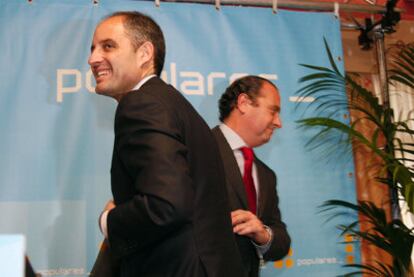Gürtel and Brugal inquiries leave PP officials in Valencia without power
Camps embarks on strategy to save the party's image - and himself
When Valencia regional premier Francisco Camps unveiled his Popular Party (PP) election slate earlier this year, there was a public outcry after it was revealed that he chose to include officials, like himself, who had been implicated or targeted in two of the biggest public-corruption investigations engulfing his region.
But now, with all of them re-elected on May 22, Camps has allowed them to take their seats in the regional parliament but has declined to give them any special posts or duties that could put them in direct contact with administering public monies. In other words, Milagrosa Martínez, Vicente Rambla, Ricardo Costa, David Serra, Yolanda García and Luis Díaz Alperi will sit alongside the rest of the PP lawmakers in the Valencia parliament but won't have any power.
It is part of a strategy, PP sources say, to save the party's image, and himself.
Nonetheless, there are two exceptions to this direction: Camps, re-elected to another term as premier, and Sonia Castedo, also re-elected as mayor of Alicante, will still be in charge of public funds.
The Valencia High Court is investigating Camps for reportedly accepting dress suits from businessmen who were connected to a bribery network known as the Gürtel ring. Those elected on May 22, who were all part of his team during his previous term, are being investigated on charges of alleged illegal campaign fundraising and bid-rigging.
The Gürtel case has ensnared a good number of PP officials in Madrid but the majority of them have stepped down or abandoned politics altogether. In Castilla y León, José Fernández Santiago, the speaker of the regional parliament, is also targeted in the investigation and continues serving as deputy. It is only in Valencia where all the PP officials under court inquiry are still on board and receiving taxpayer-funded salaries.
In Alicante, the corruption case rocking that province is an investigation into favoritism and payoffs that allegedly took place during the awarding of lucrative garbage-collection and waste-dump contracts. Besides Castedo, the so-called Brugal case has also entangled former provincial chief José Joaquín Ripoll and Castedo's predecessor Luis Díaz Alperi. Both Ripoll and Alperi continue to hold their seats in the region's parliament.
Castedo was re-elected with a sweeping majority just weeks before an investigating judge lifted the reporting restrictions on the Brugal case. According to the police, the mayor received gifts, including paid trips to Andorra, by millionaire developer Enrique Ortíz, owner of the Hércules soccer team and also targeted in the trash contract inquiry.
On Thursday, Castedo told reporters that "it is only a matter of time" before her name is cleared.
Camps' decision to keep the implicated officials on the PP bench but without any assignments is based on two premises, according to party sources. First, the regional premier wants to change Valencia's image as a hotbed of PP corruption. "What good is it when we talk about the ERE in Andalusia [a corruption case where public officials allegedly handed out early retirement packages] when in Valencia the cases here are bigger," said one PP official.
Camps' second intention is to try to detach himself from the investigation into the rest of the PP officials, who are being targeted in a phase of the Gürtel inquiry that deals with illegal campaign financing. By this, he hopes to keep the charges against him isolated to the dress suits inquiry, sources say.

Tu suscripción se está usando en otro dispositivo
¿Quieres añadir otro usuario a tu suscripción?
Si continúas leyendo en este dispositivo, no se podrá leer en el otro.
FlechaTu suscripción se está usando en otro dispositivo y solo puedes acceder a EL PAÍS desde un dispositivo a la vez.
Si quieres compartir tu cuenta, cambia tu suscripción a la modalidad Premium, así podrás añadir otro usuario. Cada uno accederá con su propia cuenta de email, lo que os permitirá personalizar vuestra experiencia en EL PAÍS.
¿Tienes una suscripción de empresa? Accede aquí para contratar más cuentas.
En el caso de no saber quién está usando tu cuenta, te recomendamos cambiar tu contraseña aquí.
Si decides continuar compartiendo tu cuenta, este mensaje se mostrará en tu dispositivo y en el de la otra persona que está usando tu cuenta de forma indefinida, afectando a tu experiencia de lectura. Puedes consultar aquí los términos y condiciones de la suscripción digital.








































